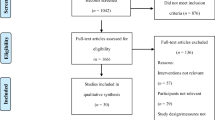Summary
This study examines the role of coping in the onset of post-traumatic stress disorder (PTSD) in a nonpatient population following exposure to a natural disaster. In contrast to other studies, the use of all coping strategies was found to be associated with the presence of PTSD rather than the absence of symptoms. These data suggest that coping (in this sense) represents a psychological process used to contain the distress caused by symptoms as well as to manage environmental adversity.
Similar content being viewed by others
References
Baum A, Fleming R, Singer J (1983) Coping with technological disaster. J Soc Issues 39: 117–138
Brett E, Ostroff R (1985) Imagery and posttraumatic stress disorder. Am J Psychiatry 142: 417–424
Brett E, Spitzer R, Williams J (1988) DSM-III-R criteria for posttraumatic stress disorder. Am J Psychiatry 145: 1232–1236
Caplan G (1981) Mastery of stress: psychosocial aspects. Am J Psychiatry 138: 413–420
Coyne J, Aldwin C, Lazarus R (1981) Depression and coping in stressful episodes. J Abnorm Psychol 90: 439–447
Edwards J, Cooper C (1988) Research in stress, coping and health: theoretical and methodological issues. Psychol Med 18: 15–20
Folkman S, Lazarus R (1980) An analysis of coping in a middle aged community sample. J Health Soc Behav 21: 219–239
Folkman S, Lazarus R (1985) If it changes it must be a process: study of emotion and coping during three stages of a college examination. J Pers Soc Psychol 48: 150–170
Folkman S, Lazarus R (1988) Coping as a mediator of emotion. J Pers Soc Psychol 54: 466–475
Heim E (1991) Coping and adaptation in cancer. In: Cooper C, Watson M (eds) Cancer and stress: psychological, biological and coping studies. Wiley, New York, pp 197–235
Heim E, Augustiny K, Blaser A, Bürki C, Kühne D, Rothenbüler M, Schaffner L, Valach L (1987) Coping with breast cancer-a longitudinal prospective study. Psychother Psychosom 48: 44–59
Hobbs M (1984) Crisis intervention in theory and practice: a selective review. Br J Med Psychol 57: 23–24
Horowitz M (1986) Stress response syndromes: a review of posttraumatic and adjustment disorders. Hosp Community Psychiatry 37: 241–249
Horowitz M, Schaffer C, Hiroto D, Wilner N, Lewin B (1977) Life event questionnaires for measuring presumptive stress. Psychosom Med 39: 413–431
Horowitz M, Wilner N, Alvarez W (1979) Impact of event scale: a measure of subjective distress. Psychosom Med 41: 209–218
Kasl S (1983) Pursuing the link between stressful life experiences and disease: a time for reappraisal. In: Cooper C (ed) Stress research: issues for the eighties. Wiley, New York, pp 79–102
Kendler KS, Kessler RC, Heath AC, Neale MC, Eaves LJ (1991) Coping: a genetic epidemiological investigation. Psychol Med 21: 337–346
Kolb L (1987) A neuropsychological hypothesis explaining posttraumatic stress disorders. Am J Psychiatry 144: 989–995
Lazarus R (1981) The stress and coping paradigm. In: Cohen D, Kleinman A, Maxims P (eds) Models for clinical psychopathology. Spectrum, New York, pp 177–214
McCammon S, Durham J, Allison E Jr, Williamson J (1988) Emergency workers' cognitive appraisal and coping with traumatic events. Traum Stress 1: 353–372
McFarlane A (1985) The effects of stressful life events and disasters: research and theoretical issues. Aust N Z J Psychiatry 19: 409–421
McFarlane A (1986) Posttraumatic morbidity of a disaster: a study of cases presenting for psychiatric treatment. J Nerv Ment Dis 174: 4–14
McFarlane A (1987) Life events and psychiatric disorder: the role of a natural disaster. Br J Psychiatry 151: 362–367
McFarlane A (1988) The longitudinal course of posttraumatic morbidity: the range of outcomes and their predictors. J Nerv Ment Dis 176: 764–769
McFarlane A (1989) The aetiology of posttraumatic morbidity: predisposing, precipitating and perpetuating factors. Br J Psychiatry 154: 221–225
McFarlane A (1992) Avoidance and intrusion in posttraumatic stress disorder. J Nerv Ment Dis 180: 439–445
Murphy S (1986) Stress, coping, and mental health outcomes following a natural disaster: bereaved family members and friends compared. Death Studies 10: 411–429
Parkes KR (1986) Coping in stressful episodes: the role of individual differences, environmental factors, and situational characteristics. J Pers Soc Psychol 51: 1277–1292
Pearlin H, Schooler C (1978) The structure of coping. J Health Soc Behav 19: 2–22
Rhode P, Lewinsohn PM, Tilson M, Seeley JR (1990) Dimensionality of coping and its relation to depression. J Pers Soc Psychol 58: 499–511
Robins L, Helzer J, Croughan I, Ratcliff K (1981) National Institute of Mental Health Diagnostic Interview Schedule. Its history, characteristics and validity. Arch Gen Psychiatry 38: 381–384
Solomon Z, Mikulincer M (1988) Attributional style and combat related posttraumatic stress disorder. J Abnorm Psychol 97: 308–313
Solomon Z, Mikulincer M, Avitzur E (1988) Coping, locus of control, social support and combat related posttraumatic stress disorder: a prospective study. J Pers Soc Psychol 55: 279–285
Solomon Z, Mikulincer M, Benbenishty R (1989) Locus of control and combat related posttraumatic stress disorder: the intervening role of battle intensity, threat appraisal and coping. Br J Clin Psychol 28: 131–144
Stewart M (1986) A study of the needs, coping styles and use of medical services of tornado victims. Can J Public Health 77: 173–179
Author information
Authors and Affiliations
Rights and permissions
About this article
Cite this article
Spurrell, M.T., McFarlane, A.C. Post-traumatic stress disorder and coping after a natural disaster. Soc Psychiatry Psychiatr Epidemiol 28, 194–200 (1993). https://doi.org/10.1007/BF00797323
Accepted:
Issue Date:
DOI: https://doi.org/10.1007/BF00797323




